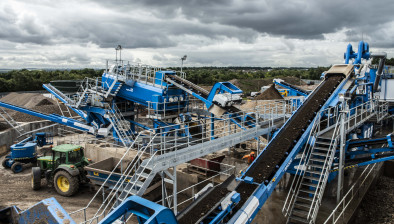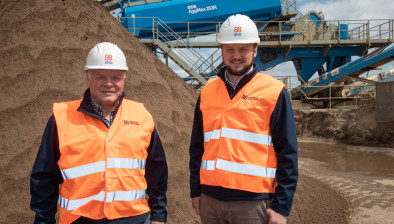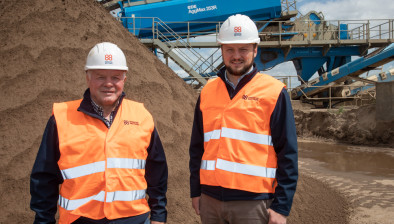Brewster Brothers makes Earth Day call to value our soil
Livingston-based construction waste management and recycled aggregates company Brewster Brothers is asking for a simple change to all construction tenders that it said could result in a drop of 32% of waste in landfill while saving valuable, carbon-storing soil from ending up in these sites.
Currently, more than 25% of soil excavated from construction sites up and down the country is dumped. Specifying the management and reuse of soil waste as part of contracts would make a significant impact on sustainability targets, according to MD Scott Brewster.
The company has developed a process over the past four years that has diverted over 810,000 tonnes of construction, demolition and excavation waste from landfills, extracting 660,000 tonnes of valuable resources in the process. Topsoil is recycled using a screening process that protects the organic content for use in gardens, parks and landscaping while subsoil, which is washed along with other construction waste, sorted into its constituent parts and graded for applications such as drainage gravel, pipe bedding and cable laying. This in turn reduces the demand for more carbon intensive quarried materials.
Explaining the reason behind the call, Scott Brewster said: “The traditional reaction is anything that isn’t useful on site is disposed of in landfill. Plain and simple. More and clearer information is needed to highlight the options available to the industry, paving the way for a more sustainable future.
“Putting a focus on excavated soils is an easy step and one that could have an instant impact on waste reduction and natural resource consumption targets. If all construction tenders specified the reduction, reuse and recycling of wastes along with the requirement to use more recycled construction materials, we could go a long way towards meeting net zero targets.
“The Scottish Government is currently working on a waste targets route map for 2025 as part of its journey to net zero. While there is a focus to reduce the well-known, higher polluting forms of waste such as plastics, there is a huge opportunity to dispose of soil and rubble, the materials that make up 70% of construction waste, in a more efficient and green way.”
He added: “To meet its waste targets, the government concluded that overall waste must decrease by 15% against 2011 levels. Between 2011 and 2018 this target was achieved only twice, in 2011 and 2012, when waste soil was at its lowest. From 2013 to 2018, when soil waste totalled more than 3 million tonnes each year, the 15% reduction target was unobtainable.
“Reducing soil waste, therefore, would help us take a major step towards climate change targets.”
Topsoil stores vast quantities of carbon and dumping soil in landfill is the equivalent to throwing away a valuable asset in the fight against climate change. Damaged soil releases greenhouse gases back into the atmosphere and, once trapped in landfill, it cannot provide the habitat for the millions of microorganisms that feed our plants that ultimately end up on our dinner tables.
Even some subsoils contain a varying mix of gravel, sand, silt and clay which could be recycled and given a new life as construction materials.





















